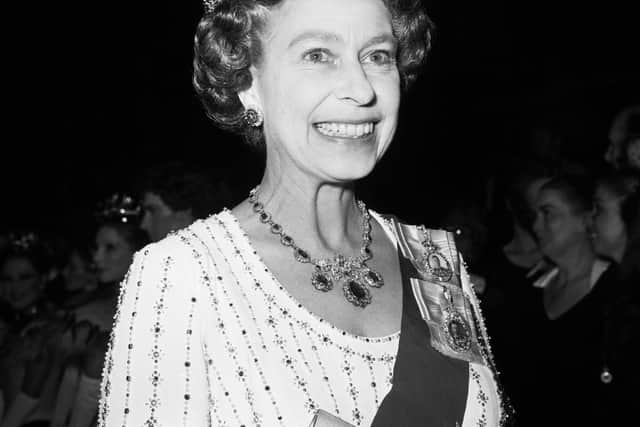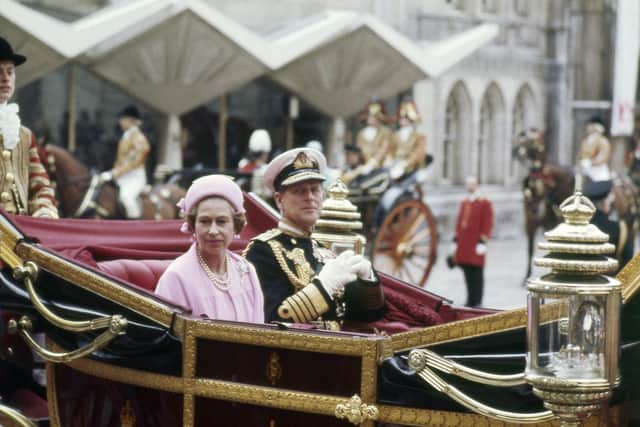Queen Elizabeth II: A new age of Elizabethan wisdom for monarch who was revered to the end - The Yorkshire Post says
Hers was the longest and most successful reign in the 1,000-year story of the British monarchy, a new Elizabethan age of wisdom, benevolence and pragmatism that was central to the country being able to weather seven decades of profound change.
Loved and revered to the end, the Queen personified continuity and stability, offering comfort to the nation in times of crisis and counsel to Prime Ministers not yet born when she came to the throne.
Advertisement
Hide AdAdvertisement
Hide AdShe was the one constant in Britain’s journey through the latter half of the 20th century and into the 21st; nobody born since she became Queen in 1952 can remember a time when she was not at the heart of national life, and that makes her loss especially hard to bear.


The extraordinary affection and respect in which she was held is unparalleled anywhere in the world, demonstrated by the avalanche of heartfelt tributes that followed her death.
Our immediate thoughts are with the Royal Family for their grievous personal loss. As the nation prepares for a state funeral and, in time, the Coronation of the King, they mourn a much-loved mother, grandmother and great-grandmother.
In doing so, they also honour the extraordinary example set by a monarch who faithfully fulfilled her Coronation vows and never deviated from the promise she made to the nation when she broadcast to her people on the day she was crowned: “Throughout all my life, and with all my heart, I shall strive to be worthy of your trust.”
Advertisement
Hide AdAdvertisement
Hide AdShe more than did so, and the Queen’s people loved her for it. The huge outpouring of affection that marked her Platinum Jubilee celebrations in June were testament to her enduring popularity. It is especially sad that she should have passed so soon after this unique milestone, when she was visibly moved by the warmth of her people’s acclaim. For many, the sight of her at that final appearance on the balcony of Buckingham Palace, her face a picture of happiness, will be a memory to treasure.


Admiration for her dedication to duty never wavered, even during the periodic crises that beset the monarchy, especially in the last quarter-century of the Queen’s reign.
The death of Princess Diana in 1997, the scandal surrounding Prince Andrew’s connections to a convicted sex offender and the departure from royal life of Prince Harry and his wife, Meghan, who then proceeded to criticise the family, all presented challenges to the monarchy.
The Queen faced them with resolve and a single-minded determination that the institution she personified must be protected at all costs. A less formal and more relaxed style of engagement with the public was adopted in response to grief at Diana’s death, and later, Andrew and Harry were dismissed from royal duties.
Advertisement
Hide AdAdvertisement
Hide AdAll showed the Queen’s acute feel for the public mood. That was never demonstrated more potently than during the greatest domestic crisis of her reign, the Covid pandemic.
As a locked-down country wondered what the future held, and families were separated, the Queen broadcast to the nation and drew on her immense experience and wisdom to offer the perfect words of comfort: “We will meet again.”
Elizabeth Alexandra Mary Windsor was not born to be Queen. A life of service to Britain, but not sovereignty over it, beckoned the young princess known lovingly to her family as Lilibet.
But the abdication of her uncle, Edward VIII, in 1936 decided her destiny. Britain has cause to be grateful for this. The vain and foolish King, with his misplaced admiration for Nazi Germany, was replaced by the dutiful and decent George VI who steadied the monarchy and inspired the country during the war years. His example of selfless devotion to the people was followed by the Queen for the rest of her life.
Advertisement
Hide AdAdvertisement
Hide AdShe was only 26 when she came to the throne, yet already wise enough to build on the affection of the nation for her father to forge the closest bond between sovereign and people in history.
In achieving that, the support and devotion of her beloved husband, Prince Philip, was invaluable. The Queen privately referred to him as “my rock”, and publicly acknowledged how much she relied upon him, saying, “He has, quite simply, been my strength and stay all these years.”
Philip’s death, aged 99, on April 9 2021 after 73 years of marriage was undoubtedly a devastating blow to her. Yet duty to the nation came first, however deep her mourning; two weeks later, she returned to carrying out official engagements.
Together, they built the modern monarchy, embracing change and decisively leading the Royal Family into an understanding that in an age of constant public and media scrutiny, it must be seen overwhelmingly as a force for good and in tune with the nation.
Advertisement
Hide AdAdvertisement
Hide AdThat benefited countless charities, voluntary organisations and good causes.
The publicity which emanated from every Royal visit, including regular engagements in Yorkshire, and Her Majesty’s uncanny knack for making each of her subjects feel special and privileged resulted in an immeasurable amount of good.
The Queen’s understanding of the need for the monarchy to be in step with the people was at the heart of the success of her reign. It was also the reason why republicanism never gained any real traction during her lifetime.
So the Empire evolved into the Commonwealth, the Queen began to pay taxes, and the Church of England more closely reflected contemporary society.
Advertisement
Hide AdAdvertisement
Hide AdThough head of the Church, and drawing lifelong comfort from her own devout Christian faith, she was also deeply respectful of other religions as Britain embraced multi-culturalism and became a vibrant multi-faith society.
She was this country’s ultimate diplomat, no mean feat given that the United Kingdom does not have a written constitution and instead entrusts each monarch to fulfil their Coronation vows to the very best of their ability.
She met, and inspired, most of the great world leaders from Winston Churchill to Nelson Mandela. She retained the trust of every Prime Minister who served under her – confidences were never broken.
She remained beyond reproach at those delicate political moments when a new government was being formed. She endured the company of some of the most unsavoury rulers in history to safeguard the interests of the Commonwealth.
Advertisement
Hide AdAdvertisement
Hide AdShe was a force for peace; the Queen’s groundbreaking visit to Ireland in 2011, and its accompanying symbolism, was emblematic of her quiet diplomacy, notably the moment when began her remarks to a state banquet in Gaelic.
The visit to Ireland was the culmination of goodwill missions around the world. Her status and hospitality ensured that these became priceless opportunities to forge political and trade links, especially so when she could wine and dine guests on Britannia before the Royal yacht was decommissioned by an unsympathetic New Labour government.
Missteps were rare and when they did happen, the Queen’s instinct was always to act to preserve the monarchy’s bond with the country.
After Diana’s death, the Queen’s decision not to lower the Buckingham Palace flag to half-mast, and remain with the young princes William and Harry at Balmoral was criticised as unfeeling.
Advertisement
Hide AdAdvertisement
Hide AdShe moved swiftly to address the public mood of mourning, broadcasting to the nation on the eve of the funeral and explaining her instincts in staying with the princes to console them were maternal. The country understood her actions were those of a compassionate grandmother, and sovereign and people were once more in accord.
There were relatively few such insights into her character over the course of 70 years, which explains why Her Majesty will, even in death, be regarded as an enigma. Even though many people believe they knew the Queen, her inscrutability meant very little was, in fact, known about her nature which was, by all accounts, far more fun-loving – and less serious – than the public image suggested.
Confirmation of a lively sense of humour came when she performed a cameo role alongside James Bond actor Daniel Craig in the opening ceremony for the 2012 Olympics, in which special effects made her appear to parachute into the stadium.
The nation will long cherish such memories. As the Queen’s life is commemorated – and celebrated – in equal measure, we give thanks for a lifetime of faithful service that earned the admiration of the whole world.
Advertisement
Hide AdAdvertisement
Hide AdWithout the stoic and unflinching leadership of Elizabeth II, the Royal Family would not be what it is today – a reassuring symbol of continuity in an ever-changing world.
The Queen made it so. History will acclaim her as one of the greatest ever Britons, and deservedly. An era has passed with her and as we mourn, the depth of our nation’s loss is immeasurable.